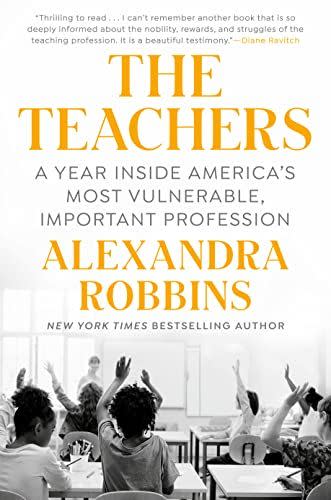What Teachers Really Think of Helicopter Parents

- Oops!Something went wrong.Please try again later.
"Hearst Magazines and Yahoo may earn commission or revenue on some items through these links."
Alexandra Robbins, a newspaper and magazine reporter and author of several books, spent a year following three teachers in school districts across the U.S. as they went about the seemingly routine business of welcoming children back to school, getting them acclimated, and guiding them through lessons, special projects, and exams. The result of her research is a new book, The Teachers: A Year Inside America's Most Vulnerable, Important Profession, which was published this week by Dutton.

The Teachers: A Year Inside America's Most Vulnerable, Important Profession
amazon.com
As she has done in past books, including The Nurses: A Year of Secrets, Drama, and Miracles with the Heroes of the Hospital, Robbins used anecdotes from her subjects’ professional and private lives, interviews with others in the profession, and in this case her own experience working as a substitute at a middle school, to illustrate the myriad challenges teachers face. Some are familiar: school underfunding, confusing state curriculums, and encroaching political influence. But The Teachers also delves into problems that receive less attention: inept administrators, back-biting colleagues, and, of all things, parents.
In a phone call last week, T&C asked Robbins to elaborate on the darker sides of parenting.
You describe wonderful parents in the book but also some who behave badly.
I chose to follow three teachers so readers could get lost in their behind-the-scenes stories and hopefully understand what school is like from a teacher's perspective. All three of them were dealing with different issues that are both relatable and revealing. But one of the biggest surprises for me during this research was that parents at their schools and others would often just say the most outrageous things to teachers that they wouldn't say to anybody else.
For example, a Michigan parent said at a parent teacher conference to a high school English teacher I interviewed, “We promised our son we'd buy him a car if he gets all As and Bs. Your class is the only class he's getting a C in, so it's your fault he can't get a car for his birthday.”
That’s ridiculous.
I'll tell you a true story—I keep saying “true story” to people because some of these things are so mind boggling that you're like, “Wait, is this non-fiction?” One day after school, a Pennsylvania high school teacher I interviewed was walking to her car in the parking lot after dismissal when a Mercedes rolled right into her. She wasn't injured, she just sort of jumped back in surprise. The parent driver, who was still on her cell phone, lowered her window and yelled, “Stop touching my car.” To me that incident illustrates this culture of teacher blaming. They are driving their car into a teacher and then blaming the teacher for touching the car!
A lot has been written about how helicopter parents treat their kids. How do they treat teachers?
You see a sort of endless desire to have their kids get the best grades and a willingness to do anything to achieve that. Parents—especially in certain districts—regularly demand meetings with teachers to get their kid’s 96% grade bumped up to a 97%. If they can’t, they go over teachers’ heads to principals and superintendents to try and get a grade change. It’s time consuming and exhausting.
Can teachers deflect?
It depends on the administrators. A bad principal will force teachers to sit through these meetings. A teacher in Texas I spoke to described how his administrator made him and two other teachers sit through a 30-minute tirade—they timed it—from a parent who blamed them [for a low grade]. Afterwards, the administrator said he knew that the parent was wrong but “just needed to vent.” Allow that to happen enough times and parents think it's okay to speak to teachers that way all the time.
What type of parental involvement is the most helpful?
Kind and courteous communication, which sounds so obvious. And not too much of it. The teachers I spoke to get way too many emails. If there's something you really need to ask that's not important, send a handwritten note with your child. While you're at it, offer to pick up supplies or help out with field trips or anything else the teacher might need.
You Might Also Like

